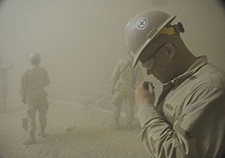Office of Research & Development |
 |
Office of Research & Development |
 |

VA Research Currents archive
August 26, 2014

U.S. Navy Petty Officer 2nd Class Eric Clark, a Seabee attached to Naval Mobile Construction Battalion 5, is caught in a sandstorm at Camp Leatherneck, Afghanistan, in May 2010. (Photo by PO2 Ace Rheaume/USN)
Military personnel who served in Iraq and Afghanistan are at an increased risk of developing respiratory illnesses, compared with non-deployed troops, according to a study involving more than 768,000 Veterans. The findings show that 6 percent of Veterans who served in Iraq or Afghanistan and received VA care between 2002 and 2011 met criteria for one or more chronic pulmonary conditions, such as asthma, bronchitis, or emphysema. Another 10.5 percent met the criteria for chronic wheezing or coughing. There was an increase in the rates of illness over the 10-year period examined by the researchers.
Similar findings, drawn from the Millennium Cohort Study, the largest health care database in military history, showed that 14 percent of military personnel who deployed reported chronic respiratory problems, compared with 10 percent among those who did not deploy.
"We started looking at this because of reports from Veterans who had been to Iraq and Afghanistan," says Dr. Mary Joe Pugh, a research scientist at the South Texas Veterans Health Care System. "It was quite surprising, the extent [with which] there were symptoms. We saw a lot of asthma or chronic obstructive pulmonary disease."
While Pugh is aware of the controversy surrounding the use of burn pits at U.S. military bases in Iraq and Afghanistan, she is cautious about linking them to the respiratory issues these Veterans are facing. "The only way to get the cause is to identify symptoms in patients and then find out their exposures to burn pits. That's how you prove causality, and so far we haven't done that," she says.
Among Pugh's findings, which she presented in August at the 2014 Military Health Systems Research Symposium in Fort Lauderdale, Fla., were that those who served in Iraq or Afghanistan more recently may be at a greater risk than those who served earlier in the conflicts. Why that is remains unclear.
Deployments to Iraq and Afghanistan have involved regular exposure to potentially dangerous particles in dust and sand, as well as inhalation of chemicals in fuel and exhaust.
What's more, according to Pugh, many Veterans either begin smoking cigarettes during a deployment or resume smoking after previously having quit. "Those with respiratory symptoms, asthma, and COPD were also more likely to smoke," says Pugh. "We need to carefully evaluate the role of smoking as well."
What is clear, according to Pugh, is that Veterans suffering the symptoms of respiratory illness should seek treatment.
"We know pretty well that individuals treated with medications tend to do better long-term and have less progression to severe lung disease," says Pugh, who advocates for continued VA and Department of Defense research to identify the specific causes of these illnesses.
"We should do pulmonary screening for Veterans having these symptoms. If I'm a Veteran and I have a cough that won't go away, I would ask to get a pulmonary functions test. Finding these problems early can alter the entire disease trajectory."
Pugh's findings follow a 2011 Institute of Medicine report that found limited but suggestive evidence of a link between exposure to burn pits and reduced lung function. That report, found here, focused on lung function rather than respiratory disease.
A 2012 study by VA and DoD researchers with the Millennium Cohort Study found little evidence of increased respiratory risk for those who had served close to burn pits in Iraq, but the issue continues to be studied.
To find out more about respiratory illness associated with serving in Iraq or Afghanistan, or to enroll in the Airborne Hazards and Open Burn Pit Registry, go to www.publichealth.va.gov/exposures/burnpits/index.asp.